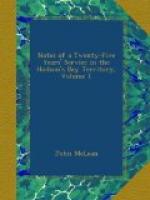Councils are held and harangues delivered when they receive their annual presents from Government; these consist of blankets, cloth, ammunition, and a variety of small articles, all of which in their present impoverished state are highly valued by them. They profess an attachment to the British Government; but, like certain more civilized nations, they will fight for the cause that is likely to yield them most advantage. Their loyalty to Britain, therefore, is less to be depended on than their hatred to America. A general idea has gone abroad regarding their taciturnity which does not accord with my experience. Far from being averse to colloquial intercourse, they delight in it; none more welcome to an Indian wigwam than one who can talk freely. They pass the winter evenings in relating their adventures, hunting being their usual theme, or in telling stories; and often have I heard the woods resound with peals of laughter excited by their wit, for they too are witty in their own way.
Their tradition of the flood (kitchi a tesoka, or “great tale,”) is somewhat remarkable. The world having been overflowed by water, all mankind perished but one family, who embarked in a large canoe, taking a variety of animals along with them. The canoe floated about for some time, when a musk-rat, tired of its confinement, jumped overboard and dived; it soon reappeared, with a mouthful of mud, which it deposited on the surface of the water, and from this beginning the new world was formed.
When the veracity of an Indian is doubted, he points to heaven with his forefinger, and exclaims:—
“He to whom we belong knows that what I say is true.”
No white man trusts more firmly in the validity of a solemn oath than the Indian in this asseveration. Still it must be confessed that they are prone to falsehood; but they seem to allow themselves a much greater licence in this respect in their intercourse with the whites than amongst themselves.
When an Indian is about to enter a wigwam, he utters the word or sound “Quay” in a peculiar tone; the word repeated from within is considered as an invitation to enter. Should he neglect to announce himself in this way he is considered as ill-bred—an unmannerly boor. The left-hand side of the wigwam as you enter is considered the place of honour; here the father of the family and chief squaw take their station, the young men on the opposite side, and the women next to the door, or at the upper end of the fire-place, both ends being alike plebeian. When a person of respectability enters, the father, moving towards the door, resigns his place to his guest, places skins under him, and otherwise pays every attention to his comfort. They are extremely hospitable, and cheerfully share their last morsel with the stranger who may be in want. Hospitality, however, is a virtue which civilization rarely improves.




